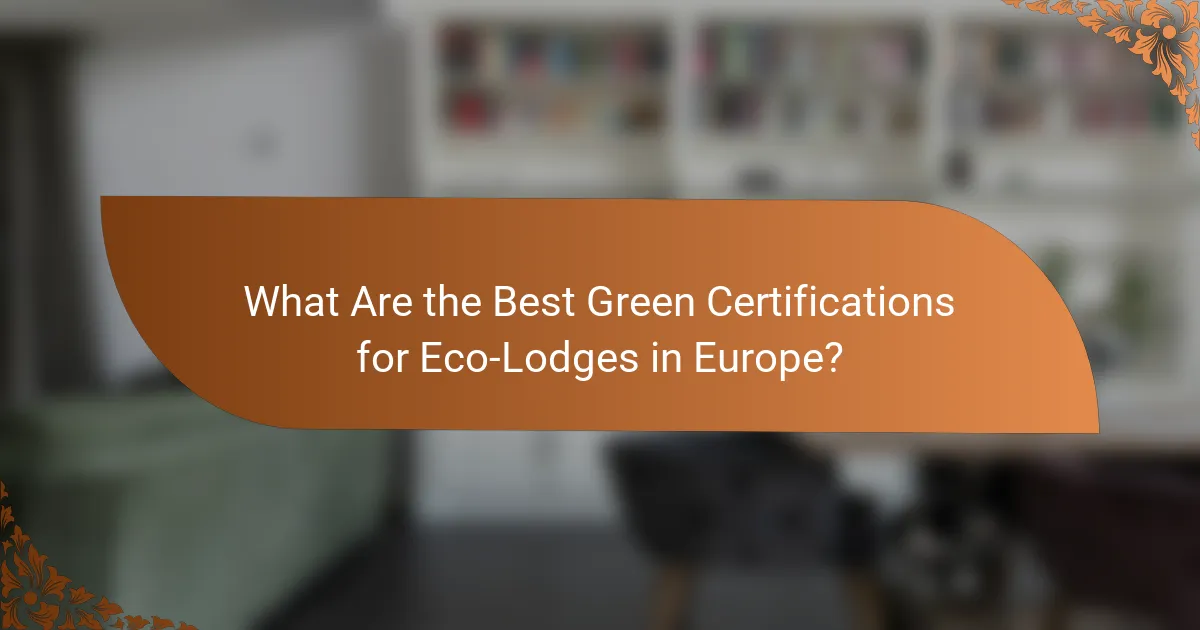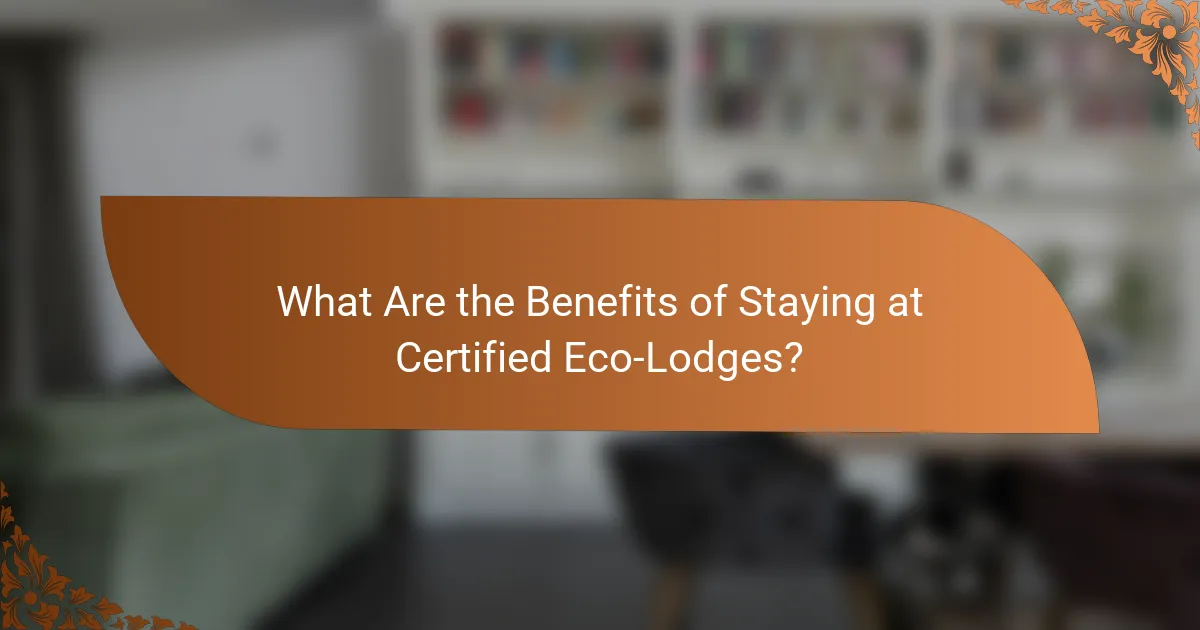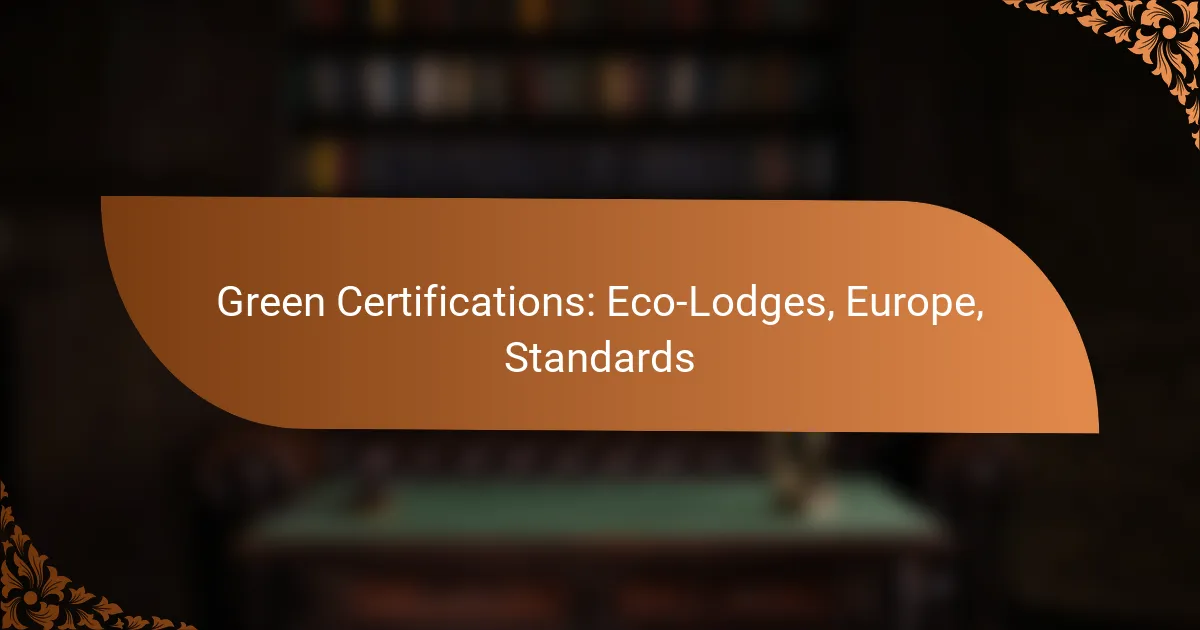Green certifications for eco-lodges in Europe, such as Green Key, EarthCheck, and EU Ecolabel, signify a commitment to sustainability and environmental responsibility. By meeting rigorous standards and implementing sustainable practices, these lodges minimize their ecological footprint while enhancing guest experiences. Choosing certified eco-lodges not only supports local communities but also ensures that your travel choices contribute positively to the planet.

What Are the Best Green Certifications for Eco-Lodges in Europe?
The best green certifications for eco-lodges in Europe include Green Key, EarthCheck, EU Ecolabel, Travelife, and LEED. These certifications help lodges demonstrate their commitment to sustainability and environmental responsibility, making it easier for travelers to choose eco-friendly accommodations.
Green Key Certification
Green Key Certification is an international eco-label awarded to hotels and other hospitality establishments that meet strict environmental standards. To obtain this certification, eco-lodges must implement sustainable practices in areas such as energy efficiency, water conservation, and waste management.
Establishments are evaluated on their adherence to criteria that promote environmental education and community involvement. Eco-lodges with Green Key Certification often display the logo prominently, signaling their commitment to sustainability to potential guests.
EarthCheck Certification
EarthCheck Certification focuses on sustainable tourism practices and is recognized globally. This certification requires eco-lodges to undergo a rigorous assessment process that evaluates their environmental performance and sustainability initiatives.
To achieve EarthCheck Certification, lodges must demonstrate measurable improvements in energy use, carbon emissions, and waste management. Regular audits ensure that certified lodges maintain high standards and continue to enhance their sustainability efforts.
EU Ecolabel
The EU Ecolabel is a European Union initiative that identifies products and services with a reduced environmental impact. For eco-lodges, this certification signifies compliance with strict ecological criteria, covering aspects like energy consumption, water usage, and waste management.
To qualify for the EU Ecolabel, lodges must provide evidence of their sustainable practices and undergo periodic evaluations. This label helps travelers identify accommodations that prioritize environmental protection and sustainability.
Travelife Certification
Travelife Certification is aimed at promoting sustainable tourism practices among hotels and accommodations. Eco-lodges seeking this certification must demonstrate their commitment to social responsibility, environmental management, and community engagement.
The certification process includes a self-assessment and an independent audit, ensuring that lodges meet the required sustainability criteria. Travelife-certified lodges often engage in local community projects, enhancing their appeal to eco-conscious travelers.
LEED Certification
LEED (Leadership in Energy and Environmental Design) Certification is a globally recognized standard for green building. While primarily focused on new constructions, eco-lodges can also pursue LEED Certification by implementing sustainable design and operational practices.
To achieve LEED Certification, lodges must earn points across various categories, including energy efficiency, water conservation, and indoor environmental quality. This certification not only enhances the lodge’s sustainability credentials but can also lead to cost savings through reduced utility expenses.

How Do Eco-Lodges Achieve Green Certifications?
Eco-lodges achieve green certifications by implementing sustainable practices, meeting regulatory standards, and conducting thorough environmental audits. These steps ensure that they minimize their ecological footprint while providing a quality experience for guests.
Implementing Sustainable Practices
To achieve green certifications, eco-lodges must adopt sustainable practices that reduce resource consumption and environmental impact. This includes using renewable energy sources, such as solar or wind power, and implementing water conservation measures like low-flow fixtures.
Additionally, eco-lodges often focus on sourcing local and organic food, reducing waste through recycling and composting, and utilizing eco-friendly materials in their construction and furnishings. These practices not only enhance the lodge’s sustainability but also appeal to environmentally conscious travelers.
Meeting Regulatory Standards
Eco-lodges must comply with various regulatory standards that govern environmental protection and sustainability. In Europe, this may include adherence to the EU Ecolabel or national certifications that set benchmarks for energy efficiency, waste management, and biodiversity conservation.
Staying informed about local regulations is crucial, as these can vary significantly by country. Eco-lodges should regularly review and update their practices to ensure compliance and maintain their certification status.
Conducting Environmental Audits
Regular environmental audits are essential for eco-lodges seeking green certifications. These audits assess the lodge’s environmental performance, identifying areas for improvement and ensuring compliance with sustainability standards.
Audits typically evaluate energy usage, water consumption, waste management, and the overall ecological impact of the lodge’s operations. By addressing the findings of these audits, eco-lodges can enhance their sustainability practices and strengthen their certification applications.

What Are the Benefits of Staying at Certified Eco-Lodges?
Staying at certified eco-lodges offers numerous advantages, including reduced environmental impact, enhanced guest experiences, and support for local communities. These lodges adhere to specific sustainability standards, ensuring that your travel choices positively affect the planet and its inhabitants.
Environmental Impact Reduction
Certified eco-lodges implement practices that significantly lower their ecological footprint. This includes using renewable energy sources, minimizing water usage, and managing waste effectively. Many eco-lodges also focus on preserving local biodiversity by maintaining natural habitats and using sustainable building materials.
For instance, eco-lodges may utilize solar panels or wind turbines to power their facilities, which can reduce reliance on fossil fuels by up to 50%. Additionally, they often employ water-saving technologies, such as low-flow fixtures and rainwater harvesting systems, to conserve this vital resource.
Enhanced Guest Experience
Guests at eco-lodges often enjoy a unique and immersive experience that connects them with nature. These lodges frequently offer activities like guided nature walks, wildlife observation, and organic cooking classes, providing a deeper understanding of the local environment and culture.
Moreover, eco-lodges typically emphasize comfort and quality, with many featuring locally sourced furnishings and organic amenities. This focus on sustainability can create a more authentic and memorable stay, appealing to travelers who value environmental consciousness.
Support for Local Communities
Staying at certified eco-lodges helps bolster local economies by creating jobs and supporting local artisans. Many eco-lodges prioritize hiring local staff and sourcing food and materials from nearby suppliers, ensuring that a significant portion of your travel expenditure benefits the community.
Additionally, eco-lodges often engage in community development initiatives, such as education programs or conservation projects, which further enhance their positive impact. By choosing to stay at these lodges, travelers contribute to sustainable development and the preservation of local cultures.

What Criteria Are Used in Green Certification Standards?
Green certification standards for eco-lodges typically assess environmental performance across several key criteria, including energy efficiency, water conservation, and waste management. These criteria help ensure that lodges minimize their ecological footprint while providing sustainable hospitality experiences.
Energy Efficiency Metrics
Energy efficiency metrics evaluate how effectively an eco-lodge uses energy resources. Common measures include the use of energy-efficient appliances, LED lighting, and renewable energy sources like solar panels. Lodges may aim for a reduction in energy consumption by 20-30% compared to conventional facilities.
To achieve these metrics, eco-lodges often conduct energy audits and implement energy management systems. Regular monitoring can help identify areas for improvement, ensuring that energy-saving measures are effective and maintained over time.
Water Conservation Practices
Water conservation practices focus on reducing water usage and enhancing water quality. Eco-lodges may install low-flow fixtures, rainwater harvesting systems, and greywater recycling systems to minimize their water footprint. Aiming for a reduction of 30-50% in water usage compared to traditional lodges is a common goal.
Additionally, educating guests about water conservation can further enhance these efforts. Simple actions, such as reusing towels and limiting shower times, can significantly contribute to overall water savings.
Waste Management Protocols
Waste management protocols are essential for minimizing the environmental impact of eco-lodges. Effective strategies include recycling, composting organic waste, and reducing single-use plastics. Many lodges strive to divert at least 50% of their waste from landfills through these practices.
Implementing a clear waste separation system for guests and staff can facilitate better recycling rates. Regular training and awareness campaigns can help ensure that everyone is engaged in waste reduction efforts, making sustainability a shared responsibility.

How Do Green Certifications Affect Pricing for Eco-Lodges?
Green certifications can significantly influence pricing for eco-lodges, often leading to higher rates due to the costs associated with meeting sustainability standards. These certifications can enhance a lodge’s appeal to environmentally conscious travelers, potentially justifying a premium price.
Cost Implications of Certification
Obtaining green certification typically involves various costs, including fees for the certification process, investments in sustainable technologies, and ongoing compliance expenses. Eco-lodges may need to upgrade facilities to meet energy efficiency standards or implement waste reduction programs, which can require substantial initial outlays.
However, these costs can be offset by long-term savings on utilities and maintenance, as well as increased occupancy rates from eco-conscious guests. Many lodges find that the investment pays off over time through enhanced reputation and customer loyalty.
Price Comparisons with Non-Certified Lodges
Eco-lodges with green certifications often charge higher rates compared to non-certified counterparts. This premium can range from about 10% to 30%, depending on the location and the extent of the sustainable practices implemented. For example, a certified lodge in a popular European destination may command significantly higher prices than a similar non-certified property.
Travelers may be willing to pay more for certified eco-lodges due to perceived value, such as better environmental practices and unique experiences. However, price sensitivity varies by market; in some regions, guests may prioritize cost over sustainability, making non-certified options more competitive.

What Are the Most Popular Eco-Lodge Destinations in Europe?
Some of the most popular eco-lodge destinations in Europe include Norway and Switzerland, known for their stunning natural landscapes and commitment to sustainable tourism. These locations offer unique accommodations that prioritize environmental responsibility while providing guests with immersive experiences in nature.
Norway Eco-Lodges
Norway is renowned for its breathtaking fjords and pristine wilderness, making it an ideal setting for eco-lodges. Many lodges here utilize renewable energy sources, such as solar and wind power, and focus on minimizing waste through recycling and composting practices.
When choosing an eco-lodge in Norway, consider locations like the Lofoten Islands or the Sognefjord region, where you can enjoy activities such as hiking, kayaking, and wildlife watching. Look for lodges that are certified by recognized standards like the Nordic Swan Ecolabel or the Green Key program, which ensure adherence to environmental best practices.
Switzerland Eco-Lodges
Switzerland offers a range of eco-lodges nestled in the Alps, providing guests with a unique blend of luxury and sustainability. Many Swiss eco-lodges emphasize local sourcing of food and materials, supporting nearby farmers and artisans while reducing transportation emissions.
Popular areas for eco-lodges in Switzerland include the Engadin Valley and the Lake Geneva region. When selecting a lodge, check for certifications such as the Swiss Ecolabel or the European Ecolabel, which guarantee that the lodge meets high environmental standards. Engaging in local activities like hiking or skiing can further enhance your eco-friendly travel experience.
